
The Liberal Party was one of the two major political parties in the United Kingdom, along with the Conservative Party, in the 19th and early 20th centuries. Beginning as an alliance of Whigs, free trade–supporting Peelites, and reformist Radicals in the 1850s, by the end of the 19th century, it had formed four governments under William Gladstone. Despite being divided over the issue of Irish Home Rule, the party returned to government in 1905 and won a landslide victory in the 1906 general election. Under prime ministers Henry Campbell-Bannerman (1905–1908) and H. H. Asquith (1908–1916), the Liberal Party passed reforms that created a basic welfare state. Although Asquith was the party leader, its dominant figure was David Lloyd George.

David Lloyd George, 1st Earl Lloyd-George of Dwyfor was Prime Minister of the United Kingdom from 1916 to 1922. A Liberal Party politician from Wales, he was known for leading the United Kingdom during the First World War, for social-reform policies, for his role in the Paris Peace Conference, and for negotiating the establishment of the Irish Free State. He was the last Liberal prime minister; the party fell into third-party status towards the end of his premiership.

The Embargo Act of 1807 was a general trade embargo on all foreign nations that was enacted by the United States Congress. As a successor or replacement law for the 1806 Non-importation Act and passed as the Napoleonic Wars continued, it represented an escalation of attempts to persuade Britain to stop any impressment of American sailors and to respect American sovereignty and neutrality but also attempted to pressure France and other nations in the pursuit of general diplomatic and economic leverage.
The Navigation Acts, or more broadly the Acts of Trade and Navigation, were a long series of English laws that developed, promoted, and regulated English ships, shipping, trade, and commerce with other countries and with its own colonies. The laws also regulated England's fisheries and restricted foreign—including Scottish and Irish—participation in its colonial trade. While based on earlier precedents, they were first enacted in 1651 under the Commonwealth.
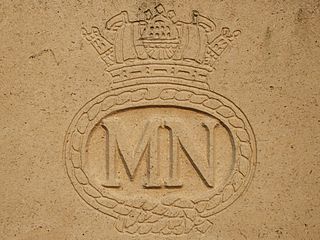
The British Merchant Navy is the collective name given to British civilian ships and their associated crews, including officers and ratings. In the UK, it is simply referred to as the Merchant Navy or MN. Merchant Navy vessels fly the Red Ensign and the ships and crew are regulated by the Maritime and Coastguard Agency (MCA), a specialist agency of the UK Department of Transport. British merchant ships are registered under the UK or Red Ensign group ship registries. British Merchant Navy deck officers and ratings are certificated and trained according to STCW Convention and the syllabus of the Merchant Navy Training Board in maritime colleges and other training institutes around the UK.
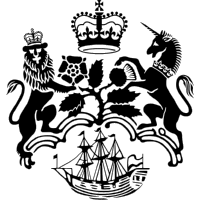
The Board of Trade is a British government body concerned with commerce and industry, currently within the Department for Business and Trade. Its full title is The Lords of the Committee of the Privy Council appointed for the consideration of all matters relating to Trade and Foreign Plantations, but is commonly known as the Board of Trade, and formerly known as the Lords of Trade and Plantations or Lords of Trade, and it has been a committee of the Privy Council of the United Kingdom. The board has gone through several evolutions, beginning with extensive involvement in colonial matters in the 17th century, to powerful regulatory functions in the Victorian Era and early 20th century. It was virtually dormant in the last third of the 20th century. In 2017, it was revitalised as an advisory board headed by the International Trade Secretary who has nominally held the title of President of the Board of Trade, and who at present is the only privy counsellor of the board, the other members of the present board filling roles as advisors.
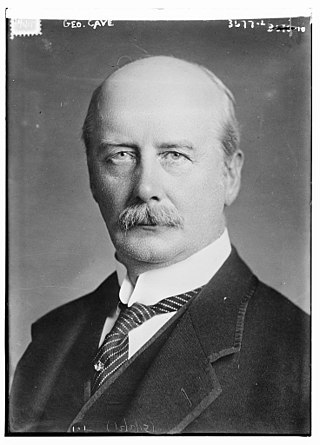
George Cave, 1st Viscount Cave, was a British lawyer and Conservative politician. He was Home Secretary under David Lloyd George from 1916 to 1919 and served as Lord Chancellor from 1922 to 1924 and again from 1924 to 1928.
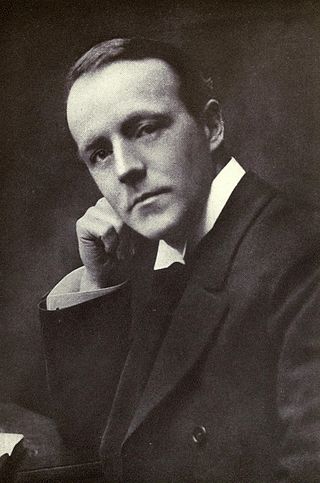
Walter Runciman, 1st Viscount Runciman of Doxford,, was a prominent Liberal and later National Liberal politician in the United Kingdom. His 1938 diplomatic mission to Czechoslovakia was key to the enactment of the British policy of appeasement of Nazi Germany preceding the Second World War.

The Merchant Marine Act of 1920 is a United States federal statute that provides for the promotion and maintenance of the American merchant marine. Among other purposes, the law regulates maritime commerce in U.S. waters and between U.S. ports. Section 27 of the Merchant Marine Act is known as the Jones Act and deals with cabotage. It requires that all goods transported by water between U.S. ports be carried on ships that have been constructed in the United States and that fly the U.S. flag, are owned by U.S. citizens, and are crewed by U.S. citizens and U.S. permanent residents. The act was introduced by Senator Wesley Jones. The law also defines certain seaman's rights.
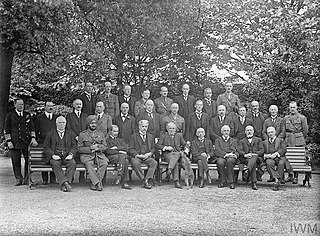
Liberal David Lloyd George formed a coalition government in the United Kingdom in December 1916, and was appointed Prime Minister of the United Kingdom by King George V. It replaced the earlier wartime coalition under H. H. Asquith, which had been held responsible for losses during the Great War. Those Liberals who continued to support Asquith served as the Official Opposition. The government continued in power after the end of the war in 1918, though Lloyd George was increasingly reliant on the Conservatives for support. After several scandals including allegations of the sale of honours, the Conservatives withdrew their support after a meeting at the Carlton Club in 1922, and Bonar Law formed a government.

The Emergency Fleet Corporation (EFC) was established by the United States Shipping Board, sometimes referred to as the War Shipping Board, on 16 April 1917 pursuant to the Shipping Act to acquire, maintain, and operate merchant ships to meet national defense, foreign and domestic commerce during World War I.

The Liberal welfare reforms (1906–1914) were a series of acts of social legislation passed by the Liberal Party after the 1906 general election. They represent the Liberal Party's transition rejecting the old laissez faire policies and enacting interventionist state policies against poverty and thus launching the modern welfare state in the United Kingdom. David Lloyd George and Winston Churchill led in designing and passing the reforms, and building nationwide support.

The Slave Trade Act of 1794 was a law passed by the United States Congress that prohibited the building or outfitting of ships in U.S. ports for the international slave trade. It was signed into law by President George Washington on March 22, 1794. This was the first of several anti-slave-trade acts of Congress. In 1800, Congress strengthened it by sharply raising the fines and awarding informants the entire value of any ship seized, as well as additional prohibitions on American investment and employment in the trade.
The maritime history of the United States is a broad theme within the history of the United States. As an academic subject, it crosses the boundaries of standard disciplines, focusing on understanding the United States' relationship with the oceans, seas, and major waterways of the globe. The focus is on merchant shipping, and the financing and manning of the ships. A merchant marine owned at home is not essential to an extensive foreign commerce. In fact, it may be cheaper to hire other nations to handle the carrying trade than to participate in it directly. On the other hand, there are certain advantages, particularly during time of war, which may warrant an aggressive government encouragement to the maintenance of a merchant marine.

The Liberal government of the United Kingdom of Great Britain and Ireland that began in 1905 and ended in 1915 consisted of two ministries: the first led by Henry Campbell-Bannerman and the final three by H. H. Asquith.

Sir Robert John Collie was a Scottish medical doctor and public servant who also served as National Liberal Party MP for Glasgow Partick from 1922 to 1923.
Merchant Shipping Act is a stock short title used in Malaysia and the United Kingdom for legislation relating to merchant shipping.

The Port of London Act 1908 was an Act of Parliament of the United Kingdom, which established the Port of London Authority and regulated corporate governance at the Port of London. It merged numerous inefficient and overlapping private companies and gave unified supervision to Britain's most important port. That enabled London to compete more effectively with Hamburg and Rotterdam. David Lloyd George, the President of the Board of Trade, was the major sponsor for the Liberal Party.

The Sea Transport Branch of the British Board of Trade, originally established as the Transport Department or Naval Transport Department, was a logistical branch of the Department of Admiralty responsible for the provision of naval transportation services. It underwent numerous name changes throughout its complicated history with responsibility for sea transportation, known as the Department of the Director of Transports from 1890.

MS Europic Ferry was a roll-on/roll-off car ferry built in 1967 by Swan Hunter for the Atlantic Steam Navigation Company (ASN). She was acquired by European Ferries in 1971 when they took over the ASN and served with them under the Townsend Thoresen branding. The Europic Ferry was requisitioned by the British government in April 1982 and transported stores, equipment and troops to the South Atlantic during the Falklands War. After the war she returned to service with European Ferries until that company was sold to P&O in 1987. She was sold again to Namora Shipping in 1993 and served on routes in the Mediterranean until sold for scrapping in 2004.














